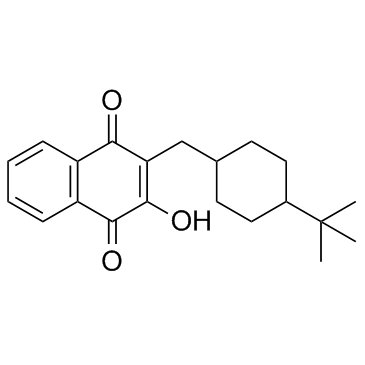Apoptosis of Theileria-infected lymphocytes induced upon parasite death involves activation of caspases 9 and 3.
Shigekatsu Fujii, Tomoyuki Morita, Shunsasku Kimura
Index: Biochimie 85(8) , 771-6, (2003)
Full Text: HTML
Abstract
The intracellular parasite Theileria parva (T. parva) can infect bovine B and T-lymphocytes. T. parva-infected cells become transformed, and they survive and proliferate independently of exogenous growth factors. In vivo the uncontrolled cellular proliferation associated with lymphocyte transformation underlies the pathogenesis of the disease called East Coast Fever. The transformed state of parasitised cells can be reversed upon elimination of the parasite by specific theilericide drugs. In this study we found that elimination of the parasite by buparvaquone induces apoptosis of transformed B and CD8(+) T-lymphocytes. Apoptosis is accompanied by the activation of caspase 9 and caspase 3 and processing of poly(ADP ribose) polymerase and is inhibited by Z-VAD a general caspase inhibitor. Based on these observations, we propose that the lack of activation of a caspase 9 > caspase 3 > poly(ADP ribose) polymerase pathway is important and protects T. parva-transformed cells from spontaneous apoptosis.
Related Compounds
| Structure | Name/CAS No. | Molecular Formula | Articles |
|---|---|---|---|
 |
Buparvaquone
CAS:88426-33-9 |
C21H26O3 |
|
Drug delivery systems for the topical treatment of cutaneous...
2012-09-01 [Expert Opin. Drug Deliv. 9(9) , 1083-97, (2012)] |
|
In-vivo therapeutic efficacy trial with artemisinin derivati...
2003-11-01 [J. Vet. Med. Sci. 65(11) , 1171-7, (2003)] |
|
Design, synthesis and in vitro evaluation of novel water-sol...
2004-10-01 [Eur. J. Pharm. Sci. 23(2) , 151-8, (2004)] |
|
The protozoan parasite Theileria annulata alters the differe...
2009-08-01 [Int. J. Parasitol. 39(10) , 1099-108, (2009)] |
|
Clinical efficacy and plasma concentrations of two formulati...
2006-08-01 [Res. Vet. Sci. 81(1) , 119-26, (2006)] |